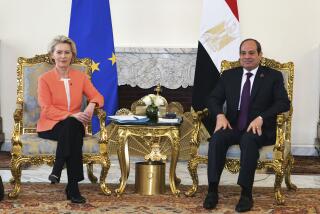Egyptians Reject Jet Crash Report
- Share via
CAIRO — A headline in Egypt’s top newspaper Friday demonstrated how this conservative Muslim nation is reacting to a U.S. report that an EgyptAir co-pilot intentionally sent a passenger jet plummeting into the ocean in 1999: “American authorities intentionally withheld information and did not solve the mystery of the crashed plane.”
That was what readers were served up in Al Ahram, the government-owned daily, a day after the National Transportation Safety Board formally announced that Egyptian co-pilot Gamil El Batouty deliberately downed the plane, killing all 217 people on board.
There was no mention here of NTSB conclusions that the plane’s mechanical and control systems were in working order, or that Batouty disengaged the autopilot, or that he methodically plunged the plane into the Atlantic Ocean off Massachusetts.
Egyptians, instead, have fixated on “the leak”: Shortly after the plane went down, U.S. investigators leaked to the media their suspicion that Batouty was responsible, in part because he was heard on the voice data recorder saying, “Tawakalt” (I rely on God).
Egyptians use this phrase routinely, and they immediately jumped on the U.S. allegation as the result of religious bias or cultural illiteracy. To this day, that view has framed the debate for the government-owned airline, the government leadership and the family of the accused.
“The report is nonsense, nonsense,” said Mohammed Nabil El Batouty, the co-pilot’s cousin. “It’s a kind of evasion from liability to pay insurance. Gamil was always a competent pilot--I mean, he wouldn’t do something like this.”
Coming at a time when many Egyptians are feeling misunderstood and persecuted by the West as a result of the U.S.-led war on terrorism, the case of the Egypt airliner seemed to exacerbate a sense of victimization that has gripped this nation.
From a neighborhood grocer to Egypt’s top crash investigator, the U.S. findings have been dismissed out of hand, much the way many people here dismissed the videotape released by Washington that showed Osama bin Laden acknowledging advance knowledge of the Sept. 11 attacks.
“We want the Americans to reinvestigate the case, as they have not considered several points presented by Egyptian investigators,” including proper checks on the plane’s tail, cockpit voice recordings and radar and flight-control data, said Mohsen El Messiri, head of Egypt’s investigating committee.
EgyptAir Flight 990, bound for Cairo, took off from John F. Kennedy International Airport on Oct. 31, 1999, about 1:20 a.m. Not long afterward, the Boeing 767 plummeted 33,000 feet into the ocean. When investigators recovered the two flight recording devices, they heard what they considered to be the first evidence of wrongdoing: The plane was flying normally when Batouty said, “I rely on God”--an invocation he could be heard saying a total of 11 times on the cockpit voice recorder.
Further physical evidence showed that Batouty then sent the jet into a nose dive, while the pilot of the plane, Capt. Ahmed El Habashi, struggled to save the flight. In a story published March 15 in The Times, former EgyptAir Capt. Hanofy Taha Mahmoud Hamdy said the crash was a vengeful act against EgyptAir executive Hatem Rushdy, who was seated in first class when the plane went down. Taha--who is seeking asylum in London--told The Times that a few hours before the flight, Rushdy had reprimanded Batouty for alleged sexual misconduct.
None of this is swaying public opinion here, not among journalists, academics, government officials or investigators. Egypt is desperate to revive tourism, its No. 1 source of hard currency. After the Sept. 11 attacks, the tourist business dropped off sharply, and it has only just begun to recover. The NTSB report isn’t likely to bring tourists back, especially on the national carrier.
People here say they see a pattern in the U.S. approach--first convicting someone, then finding the evidence to prove the conviction. That’s how many people here view the case against Bin Laden as well as the one against the co-pilot.
“The problem is in both cases there are similarities,” said Emad Shahin, a professor of political science at American University in Cairo. “You name a suspect. Then you look for facts to prove it. That, of course, is why people rejected this.”
But that’s not the only reason Egyptians have trouble with the findings. Virtually everything that happens here must be viewed through the prism of the Muslim faith and relations with the Jewish community. As a society, Egypt is devoted to Islam--and suspicious of Jews.
Suicide is a sin in Islam, and the person who kills himself is no longer considered a Muslim. So it is difficult, if not impossible, for people here to understand how Batouty, who had a sick daughter, would have killed himself while calling on God to protect him. The fact that the United States has come to this conclusion reinforces the belief among some people that the Jewish community controls America’s government.
“It is impossible for someone to kill himself,” said Mohammed Suleiman Ibrahim, 67, a Cairo grocer. “Maybe the Jews influenced the report. There is no problem between Egyptians and Americans. If they want to say something incriminating, they should at least come up with something logical enough to believe.”
Ahmed Mohammed Mahmoud, 24, who said he serves in the military, expressed a similar suspicion: “The problem is that there are people who don’t want the relations between the Americans [and the Egyptians] to be good. Maybe Israel, I don’t know. Our problem is that . . . Americans don’t know us. So they don’t understand that Egyptian people are good and don’t do things like that.”
*
Aline Kazandjian of The Times’ Cairo Bureau contributed to this report.
More to Read
Sign up for Essential California
The most important California stories and recommendations in your inbox every morning.
You may occasionally receive promotional content from the Los Angeles Times.










